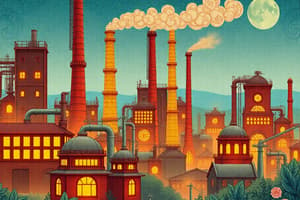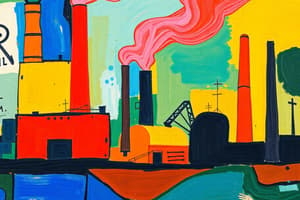Podcast
Questions and Answers
What was a key factor that contributed to the beginning of the Industrial Revolution in Britain?
What was a key factor that contributed to the beginning of the Industrial Revolution in Britain?
- The decline of the Maritime Empire
- The expansion of shipbuilding in Southeast Asia
- The decrease in crop yields
- The Second Agricultural Revolution (correct)
Why did urbanization play a crucial role in the Industrial Revolution?
Why did urbanization play a crucial role in the Industrial Revolution?
- It decreased access to natural resources
- It led to a large pool of labor for industrial production (correct)
- It hindered specialization of labor
- It reduced the need for mechanized production
What were the easily accessible natural resources that were key to industrialization in Britain?
What were the easily accessible natural resources that were key to industrialization in Britain?
- Timber, fertile soil, and wind energy
- Salt, copper, and desalinated water
- Coal, iron, and navigable rivers (correct)
- Gold, silver, and precious stones
What was a significant outcome of industrialization in terms of manufacturing trends?
What was a significant outcome of industrialization in terms of manufacturing trends?
Why did India and Southeast Asia see a decline in their manufacturing share during the Industrial Revolution?
Why did India and Southeast Asia see a decline in their manufacturing share during the Industrial Revolution?
Which of the following was NOT a factor that contributed to the beginning of the Industrial Revolution?
Which of the following was NOT a factor that contributed to the beginning of the Industrial Revolution?
What is the primary source of energy for the steam engine mentioned in the text?
What is the primary source of energy for the steam engine mentioned in the text?
Which fossil fuel is used in the internal combustion engine?
Which fossil fuel is used in the internal combustion engine?
What marked the Second Industrial Revolution in the second half of the 19th century?
What marked the Second Industrial Revolution in the second half of the 19th century?
Which country failed to transition to industrial textile production due to lack of resources and financial mismanagement?
Which country failed to transition to industrial textile production due to lack of resources and financial mismanagement?
Under which ruler did Japan adopt Western technology and ideas, resulting in a complete transformation of their society?
Under which ruler did Japan adopt Western technology and ideas, resulting in a complete transformation of their society?
What was the primary energy source for the steam engines and internal combustion engines?
What was the primary energy source for the steam engines and internal combustion engines?
Which country began industrialization under the Russian Zars and became the fourth largest steel producer?
Which country began industrialization under the Russian Zars and became the fourth largest steel producer?
What was used for construction and transportation during the Second Industrial Revolution?
What was used for construction and transportation during the Second Industrial Revolution?
Which industry used the steam engine for driving the engine during the industrial revolution?
Which industry used the steam engine for driving the engine during the industrial revolution?
Which nation opened up trade relations and adopted Western technology and ideas, resulting in a complete transformation of their society?
Which nation opened up trade relations and adopted Western technology and ideas, resulting in a complete transformation of their society?
Flashcards are hidden until you start studying
Study Notes
- The Industrial Revolution began in Britain, with reasons including the Second Agricultural Revolution and urbanization.
- Agricultural innovations such as the seed drill, norfol fourfield system, and enclosure acts increased crop yields and reduced labor needs.
- Urbanization led to a large pool of labor for industrial production and facilitated specialization.
- Britain had easily accessible natural resources like coal, iron, and navigable rivers, which were key to industrialization.
- Britain had a well-established Maritime Empire with abundant access to foreign resources and capital.
- The factory system emerged in Britain, with mechanized textile production and increasing specialization of labor.
- Before 1750, the largest manufacturing occurred in Asia, particularly China and India, but after 1750, industrialized countries saw a significant increase in manufacturing.
- Industrialization spread to other countries in Europe and the United States.
- Non-industrialized countries saw a decrease in manufacturing share due to inability to keep up with industrialized countries' production.
- India and Southeast Asia had a long tradition of shipbuilding and iron production but were outcompeted by industrialized countries.
- Imperialism was another reason for India's decline in manufacturing share.- Fossil fuels Revolution: Fossil fuels, such as coal and petroleum, contain a large amount of energy that can be released when burned. This Revolution increased the energy available to human societies and led to the use of steam engines and internal combustion engines.
- Steam engine: Used in textile industry, consists of a boiler that heats water and turns it into steam, expanding to drive the engine. Coal is burned to produce heat.
- Internal combustion engine: Uses fossil fuel petroleum, converts heat energy into mechanical energy, and was used to develop the first petroleum-powered automobiles.
- Second Industrial Revolution: Occurred in the second half of the 19th century, featured advancements in steel production (Bessemer process) and chemical industrialization. Steel was used for construction and transportation, and electricity became a new energy source.
- Government's role in industrialization: Industrialized nations became great powers, and some non-industrialized states attempted to modernize and join the trend. Muhammad Ali of Egypt introduced cotton cultivation as a cash crop but failed to transition to industrial textile production due to lack of resources and financial mismanagement. Russia began industrialization under the Russian Zars and had notable successes, including becoming the fourth largest steel producer. Japan, under the Tokugawa Shogun, opened up trade relations and adopted Western technology and ideas, resulting in a complete transformation of their society.
Studying That Suits You
Use AI to generate personalized quizzes and flashcards to suit your learning preferences.





